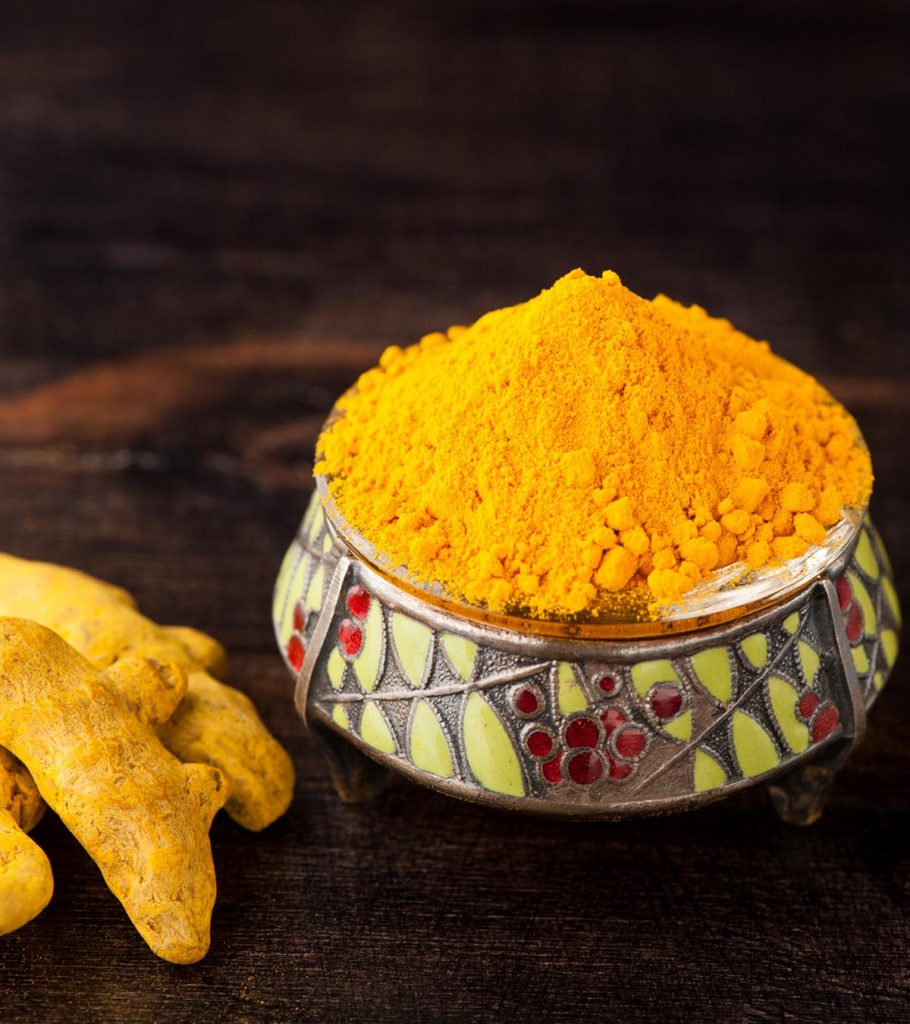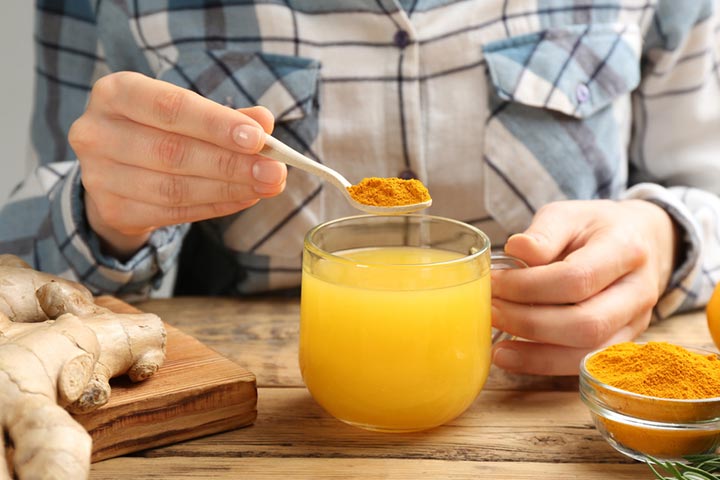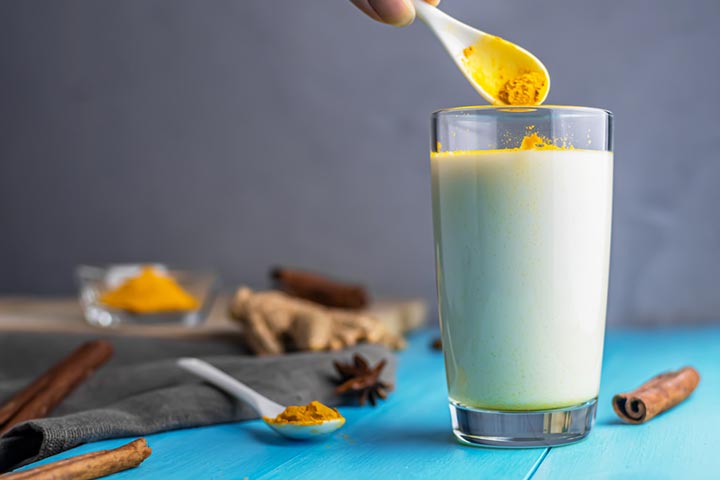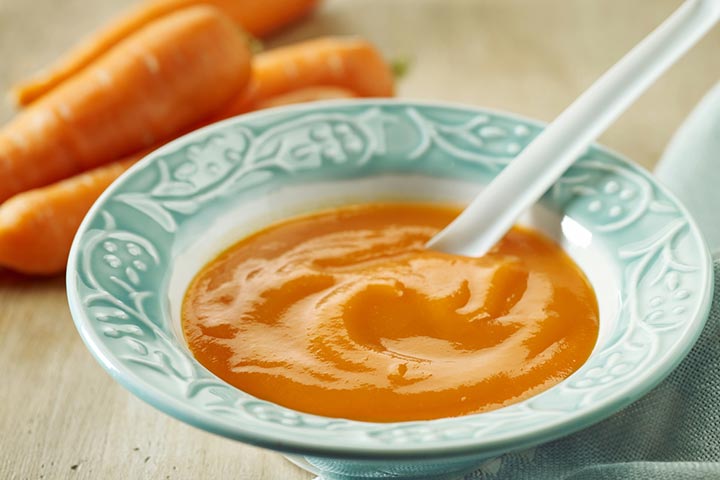Turmeric (Curcuma longa) is a spice belonging to the ginger family. Although the use of turmeric for babies isn’t well-researched, it is commonly used for its dietary and medicinal purposes in Asia. For instance, many cultures use turmeric as an antibiotic to heal wounds.
If you wish to include this wonder spice in your baby’s diet, knowing when to introduce it is essential. Keep reading as we tell you about the safety of turmeric for babies, its possible health benefits and side effects, and precautions to take when feeding turmeric to babies.
Can Babies Have Turmeric?
Yes, babies can have turmeric. The US Food and Drug Administration considers turmeric as ‘generally recognized as safe’ for use in food (1). However, there are no clear clinical indications about the safety of turmeric in infants. If you are unsure about the safety, you may consult an infant nutrition specialist before introducing turmeric to a baby.
Avoid feeding turmeric to newborn babies or babies under six months, who are solely dependent on breast milk for their nutritional needs.
When To Introduce Turmeric To Babies?
Turmeric, as a spice, can be introduced to babies as soon as they start eating solids, which is around the age of six months. You may add small amounts of turmeric in vegetable purees, soups, dals (lentils), and vegetable cereals.
However, if your baby is on medications, talk to a pediatrician because turmeric can have possible drug interactions (2).
Health Benefits Of Turmeric For Infants
Turmeric does not have any specific nutrients that could enhance the nutritional value of the food via nutrient absorption. However, it has certain bioactive compounds such as curcumin and curcuminoids that can be beneficial for the overall infant health.
- Gastrointestinal diseases: Regular consumption of turmeric is known to support digestion and gastrointestinal health by stimulating bile acid production (3). It is also considered to treat and manage gastric issues such as dyspepsiaiXUpper abdominal discomfort or pain associated with indigestion , loss of appetite, intestinal gas, and irritable bowel syndrome (IBS) (4) (5). However, it requires deeper research to validate these uses.
- Cardiovascular health: Owing to the antioxidantiXMan-made or natural substances that may prevent or slow down cell damage caused due to harmful molecules called free radicals, anti-inflammatory, and anti-thromboticiXProperty of a food or drug to prevent the formation of blood clots properties of curcumin, the use of turmeric is promoted for heart health (6). Recent research shows that regular consumption of turmeric, in the long run, is associated with a decrease in total cholesterol, LDL, and triglycerides (7). However, it is not known if these qualities could benefit a baby.
- Immunity: In some cultures, turmeric is seen as one of the best immune-boosting foods. Curcumin is known to modulate the immune response by modulating the activation of macrophagesiXSpecialised immune cells that can detect and destroy bacteria and other disease-causing organisms , neutrophilsiXA type of white blood cell that helps fight bacteria, viruses, fungi, and inflammation, natural killer cells, etc. (8). You may add small amounts of turmeric in food.
- Pain management: Oral and topical use of turmeric is associated with effective pain management. In complementary medicine, it is used to manage arthritisiX An autoimmune disease causing inflammation and pain in one or more jointsand osteoarthritisiX The most common type of arthritis, also identified as a degenerative joint disease (DJD)pain (9). Curcumin is the yellow-colored bioactive compound of turmeric that gives the spice natural pain killer properties.
- Skincare: Early evidence from several clinical studies suggests that oral and topical use of turmeric may improve skin health (10) (11). However, more intensive research trials are needed to validate the suggestion.
- Cough: In Ayurveda, Unani, and Chinese medicines, turmeric is considered to expel phlegm and provide relief from cough and cold (12). Several clinical studies support this use due to the anti-inflammatory properties of curcumin that help provide relief from respiratory issues and thereby promote respiratory health (13).
- Overall health: Curcumin from the turmeric root possesses strong antioxidant and anti-inflammatory properties (14). Besides, turmeric also possesses antiviral and anti-bacterial properties that could help in fighting infections. The antimicrobial activity of turmeric is attributed to the presence of curcumins, curcuminoids, turmeric essential oil, and other bioactive compounds such as turmerol and valeric acid (15).
- Herbal home remedies: If your pediatrician allows, you may use turmeric for herbal and natural remedies, such as:
- Topical application of turmeric paste over a small cut or wound. You may also add sandalwood paste along with turmeric paste.
- Oral use of turmeric in the form of turmeric (haldi) milk. This is a household recipe and a traditional medicine used for treating wounds and infections in India.
- Turmeric is also used for providing relief from colic and is widely known to aid in fever reduction.
Possible Side-effects Of Turmeric For Babies
Turmeric generally is well-tolerated and is considered safe. However, when consumed in large amounts, it could cause gastric issues such as an upset stomach or diarrhea. Thus, contrary to the popular belief, turmeric does not act as a diarrhea relief medicine. Besides, it has some other possible side-effects.
- Iron absorption: Turmeric could inhibit the body’s iron absorption by 20-90%, thus increasing the risk of iron deficiency anemia (16). Turmeric consumption should be carefully regulated in babies with anemia or chronic low iron reserves in the body.
- Possible drug interaction: If your baby is on any medication, then consult a pediatrician before introducing turmeric in your infant’s diet. This is crucial as turmeric is known to have drug interactions, such as with diabetes medicines, blood thinners, and medicines used for regulating stomach acid production (17).
- Allergy: According to the CDC’s National Health Interview Survey 2021, the prevalence of food allergies in children aged zero to five years is 4.4%. Although turmeric is not a common allergen, it can cause an allergic reaction (18). Generally, spices like turmeric can have non-allergic or allergic reactions in sensitive individuals (19) (20). If your baby shows signs of allergy or sensitivity, avoid using turmeric or any product containing turmeric.
Precautions To Take While Using Turmeric For Babies And Toddlers
Take the following measures while using turmeric for your baby.
- Use organic turmeric powder from a trusted brand.
- If possible, go for homemade powder. However, ensure proper hygiene while preparing the powder at home.
- Use turmeric only in a small amount. Avoid using any dietary supplements made of turmeric/curcumin for babies. Turmeric in excess may lead to hepatotoxicityiXChemical or food-driven liver damage, which is a condition that causes damage to the liver (21).
- If your infant is allergic or sensitive to turmeric, then check the labels of the food purchased. Avoid buying products that contain turmeric or curcumin in any form.
Ways To Include Turmeric In Your Infant’s Diet
Once solids are started, healthy babies can consume turmeric through various homemade baby food recipes. However, use no more than a pinch at a time.
- Turmeric powder can be added to vegetable purees and various soup preparations. Later, as your child starts taking mixed grains and cereal products like khichdi and dals, turmeric can be added to each of these as a spice.
- If you have started cow’s milk for your toddler older than a year, then you may consider preparing turmeric milk for them. Prepare it by adding a pinch of turmeric to the milk and let it come to boil. Switch off the flame and serve once it’s cool. You may also add almond powder to the milk to intensify the nutritional value of the recipe.
- You can prepare a curry mix with a fine powder of turmeric. This mix is used in Indian cuisine as a flavor in various recipes such as vegetable, chicken, or egg curry.
Turmeric for babies is considered safe once they turn six months. The bioactive active compounds present in the spice offer holistic health benefits such as protection from gastrointestinal diseases, promotion of cardiovascular health, and relief from cough. You may also use a small amount of turmeric as a herbal medicine. However, be cautious of the amount of turmeric given to babies. Excess turmeric may hinder iron absorption, interact with drugs, or cause allergy. Hence, talk to your doctor about the safety of turmeric for babies who are on certain medications.
Key Pointers
- Turmeric is safe for babies and can be introduced at around six months of age.
- Turmeric may help babies by enhancing their immune systems, promoting heart health, and alleviating coughs and colds.
- Excessive consumption of turmeric may trigger an allergic reaction and interfere with iron absorption in babies.
- Turmeric can be served to the baby by mixing it with milk, curries, and soups















